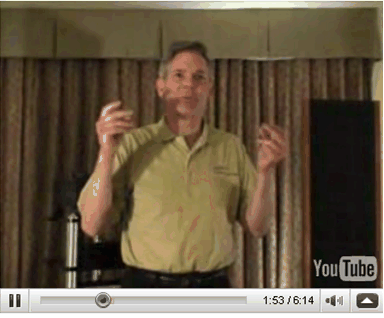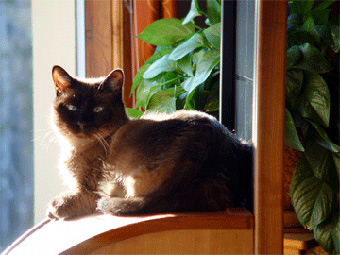Price $20,000
This price includes:
-
Electrostatic Speakers with 1) aluminum bass driver and 2) revised transmission line
-
Magtech Amplifier
-
New LMS (Loudspeaker Management System) includes digital crossover with a Room Correction System, Digital Signal Processor, and Real Time Analyzer
DESIGN PHILOSOPHY
Roger Sanders built his first ESL (Electrostatic Loudspeaker) in 1972. He quickly appreciated the superior performance that a massless electrostatic offered over conventional magnetic speakers with regards to low distortion, lack of resonances, and incredible detail. But their problems of limited output, inability to produce deep powerful bass, and unreliability have kept him busy improving them over the last 30+ years.
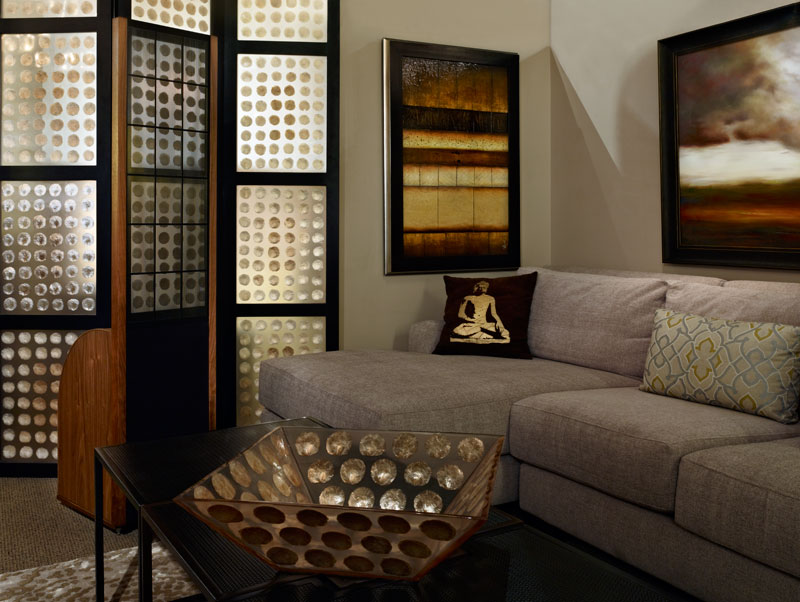
The result of this lifetime of work is that Sanders Sound Systems ESLs are the only ones to have solved all the problems and limitations of ESLs. Roger's "Ultrastat" panels will play at ear-bleeding levels, cannot be arced, do not use or need protective circuitry, are immune to humidity, dust, and dirt, and do not need or use dust covers. They can be driven by multi-thousand watt amplifiers without damage. They are more rugged than conventional magnetic drivers. They do not fail and are so robust that they come with a lifetime warranty.
The Model 10 electrostatic speaker is Sanders' flag ship. It is the best speaker Roger knows how to make after 30+ years of research, design, and testing of electrostatic speaker. This is simply a no-compromise electrostatic speaker that solves all the problems that plague other electrostatic speakers.
________________________________________
The Model 10 will play at concert hall levels and can be used with multi-thousand watt amplifiers without arcing or damage. No protective circuitry is used or needed. It will reproduce the full dynamic range of any music without strain. Deep powerful bass is assured with the use of a transmission line woofer system. The woofer system has been specifically designed to stop and start faster than other woofers so that perfect integration with a massless ESL finally is achieved.
Passive crossovers are not used as they are seriously flawed and degrade the performance of any speaker. Expensive electronic crossovers and biamplification are used to achieve spectacular levels of performance.
This speaker practically disappears into the room, both sonically and visually. This helps with the age old problem of the speakers taking over the room. This integrated speaker system will be a worthy anchor of a reference-level high-end audio system of the highest performance possible.
Our Latest Design is our Model 10e Electrostatic Speaker
The Absolute Sound’s 2016 Golden Ear Award Recipient
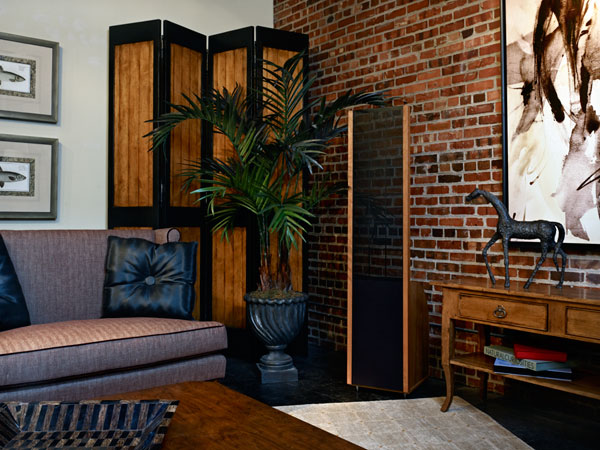
Sanders Sound Systems has been producing the most advanced and sophisticated speakers available for many years. We do not compromise. We use only the best technology, which includes electrostatic midrange/treble, transmission line bass, digital electronic crossovers with electronic time alignment, and biamplification using the unique, voltage-regulated, Magtech amplifier.
However, a truly State-of-the-Art loudspeaker must also include an RCS (Room Correction System) since even a perfect loudspeaker will have its frequency response degraded by the room/speaker interaction and bass resonances produced by room dimensions. Any speaker that does not use an RCS is simply not performing to its full potential.
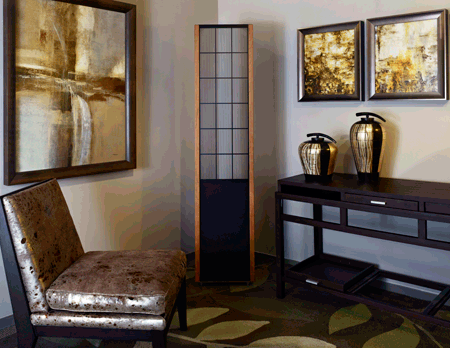
Additionally, a S.O.T.A. speaker needs a DSP (Digital Signal Processor) so that the user can tailor the speaker's frequency response to compensate for deficiencies in recordings and to best match his personal preferences in how his speaker system should sound.
An S.O.T.A. speaker needs an RTA (Real Time Analyzer) so that the user can actually measure the frequency response of his speakers and room. Only then can he have the information needed to actually know how to adjust the frequency response of his system -- instead of just guessing and trying to optimize it "by ear."
When all these features are combined with a modern, digital crossover, the resulting component is called an LMS (Loudspeaker Management System). Unfortunately, there has been no comprehensive, simple to operate, self-contained, practical, and automated LMS available until recently.
Sanders Sound Systems has finally developed the first, truly S.O.T.A. speaker using all the technology and features available in an LMS in the new Model 10e speaker system. The Model 10e does not require an outboard computer to operate, has an automated RCS, includes an independent RTA, and makes it possible for the owner to infinitely tailor the frequency response of the audio system to whatever degree he feels necessary.
When these advanced electronic features are combined in an electrostatic loudspeaker with transmission line woofer system, the result must be heard to be believed.
The Model 10e speaker is now available for immediate delivery. The price is $20,000, which includes electrostatic speakers, aluminum transmission line woofer systems, the new LMS, and a Magtech amplifier that can be used for powering either the panels or the woofers.
This is truly a State-of-the-Art loudspeaker system that has no peer. Try it using our 30-day, risk-free, in-home trial, which applies to customers everywhere in the world.
Sanders Sound hits the Sweet Spot - AudiogoN
"Roger Sanders, inventor of the curved electrostatic loudspeaker, will make you rethink everything you always thought you knew about stats. He sure did (rethink everything) to the point of abandoning his own invention for a contradictory philosophy. His logic is irrefutable, his speakers are infallible, and his electronics are unstoppable. Check out this video for a crash course on electrostatic myths and mating." - AudiogoN
A major part of his work was devoted to dealing with the issue of high frequency "beaming" in large, planar loudspeakers. To deal with this issue, he invented the free-standing, curved, electrostatic panel. This made it possible to widely-disperse the high frequencies from a large ESL. He published this invention in Speaker Builder Magazine in 1980. The Martin Logan company adopted his technique in their ESLs.
Roger expected that his wide-dispersion, curved panels would perform better than narrow-dispersion, planar speakers. But he discovered that the curved panel was inferior to a planer one with respect to transient response, imaging, frequency response, speaker placement, and output. These problems caused by wide-dispersion speakers spraying their sound all over the room instead of being directed at the listener. As a result, in a wide-dispersion speaker, the listener hears the room with all its confused and delayed reflections instead of the superb sound available directly from a planar ESL. Roger won't compromise the quality of the sound by using his wide-dispersion design, so he abandoned it in favor of planar ESLs. The sound from his planar speakers are superior to all others with regard to transient response, 3-dimensional imaging, and frequency response.
Full-range, crossoverless ESLs are widely believed to be the "holy grail" of loudspeakers. In theory, using a single drive to reproduce the entire audio range, without the problems introduced by crossovers, would be ideal. Roger has built many such speakers. But the laws of physics cannot be circumvented. A full-range ESL simply cannot produce deep, powerful bass or have generally high output and full dynamic range.
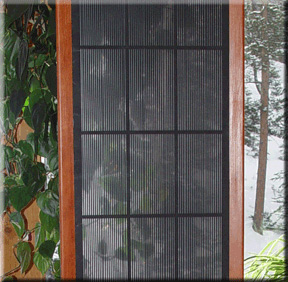
Roger spent 17 years developing woofer systems that would blend seamlessly with a massless ESL to produce outstanding bass and end the frustrating limitations of full-range ESLs. His well-designed, hybrid systems are far superior to a full-range, crossoverless ESL.
While building and selling full-range ESLs is easier and less costly than a hybrid, Roger won't compromise. Therefore all Sanders speakers are hybrids.
Crossovers are a major limitation in conventional speakers. The passive crossovers typically used are seriously flawed and cannot be used if you want a speaker with the highest possible performance. Electronic crossovers and bi-amplified operation are far superior to passive crossover systems and are absolutely essential for spectacular speaker performance. Therefore, all Sanders' speakers come with electronic crossovers and bi-amplification.
________________________________________
To eliminate the usual customer complaint about having to buy two amplifiers to operate bi-amped speakers, Sanders supplies a Magtech amplifier as part of each Model 10 speaker system. The customer then only has to provide a single amplifier of his choice just as they would for any conventional speaker system.
These amplifiers are not cheap, underpowered, or Class D switching amplifiers. They are multi-hundred watt, Class AB amplifiers that are very expensive, offer the finest in performance, come in beautiful chassis, and will drive the speakers with full dynamic range at realistic, concert hall levels.
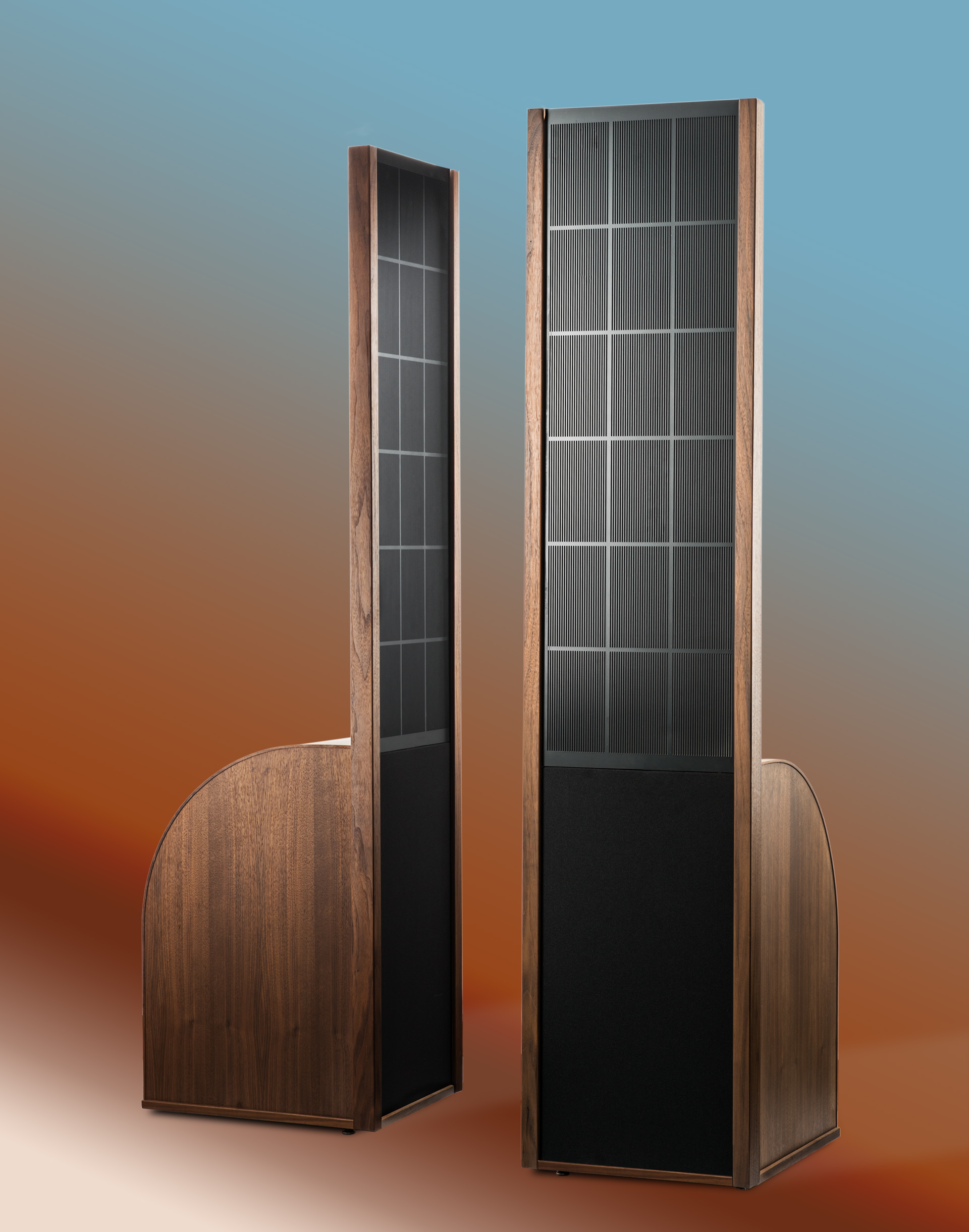
When a speaker system is put in a room, it will interact with the room and this will have adverse effects on the sound. Even a "perfect" speaker system will be degraded by the room. It therefore is essential for all speakers to be adjustable to compensate for room effects. The electronic crossovers used in Roger's speaker systems have extensive controls to allow the user to adjust the speaker to compensate for the flaws in his listening room.
This adjustability means that the user can make the speakers sound almost any way they wish. It is no longer necessary to be "stuck" with the particular sound of a room/speaker combination as is the case with conventional speakers. If you don't like what you hear with Sander's electrostatic speakers, you can adjust them so that they sound the way you like.
In summary, Sanders' speakers use the finest technology and design possible.
No compromise is made to either to reduce cost or sacrifice any aspect of speaker performance. The combination of electrostatic mids/highs, transmission line woofers, and fully adjustable electronic crossovers makes it possible finally to have a speaker system that can do it all without compromise.
Features of our Model 10 speakers
- Perfect Insulation
- The amplifier cannot damage the Ultrastat panel
- No protective circuitry required
- Panel is arc-proof
- Extremely rugged and durable
- Immune to dust, dirt, humidity, insects, pet fur, and foreign objects
- Higher sensitivity (94 dB)
- Highest precision - made with computerized diamond routing equipment
- Greater percentage of open area and visual transparency
- More attractive appearance than perforated metal designs
- Voltage is user selectable for use world-wide
- Highly efficient operation permits the electronics to be left on continually without concern for electricity usage
Loudspeaker Management System (LMS)
Your preamp or music source drives the LMS instead of the single amplifier used to power conventional speakers with passive crossovers. The speakers are biamplified, which means that two amplifiers are required. One amp drives the electrostatic panels and the other drives the woofers. The amplifiers are driven by the LMS rather than your preamplifier.
The LMS will accept both analog and digital inputs. The analog input uses conventional interconnects just like you are using now to drive an amplifier.
The digital input uses a single interconnect just like you would when connecting a CD player, server, etc. to an external DAC. Of course, no external DAC is required as the LMS has DACs built into it so that its output will be analog so it can drive your amplifiers.
The LMS is a professional device that operates using the professional linear PCM format (like CDs and the "Hi Rez" format of 24/96. It will not accept compressed formats like MP3.
The LMS will accept both balanced and unbalanced analog signals. However it only has XLR connectors. So if you wish to use unbalanced RCA interconnects, you will need to use XLR/RCA adapters on your RCA cables. These are very inexpensive and readily available. Alternatively, you can use cables with XLR connectors on one end and RCA connectors on the other.
The same is true when using the digital input. It will accept both S/PDIF (RCA) and AES/EBU (XLR) inputs. If your music source has a coaxial digital output, which uses an RCA connector, then you can use an XLR/RCA adaptor on one end to plug it into the LMS.
Here is a photo of the front panel of the LMS.

If you want complete information and specifications on the LMS, please go to DBX's professional website and search for the VENU360. The website is www.dbxpro.com.
Specifications Model 10
Electrical Specifications
| Sensitivity 94 dB | ESL Power Handling Unlimited for any amplifier intended for domestic use |
| Bass Driver 10" | Bass Design Transmission Line |
| Crossover Frequency User adjustable Factory settings 172 Hz, 48 dB/octave slopes, Linkwitz-Riley filter |
Frequency Response 20 Hz. to 27 KHz. +/- 2 dB |
| Magtech Amplifier Power 500 watts RMS per channel into an 8 ohm load 900 watts RMS per channel into a 4ohm load |
Both Balanced and Unbalanced Input / Output Connections |
Weight and Dimensions
| Speaker Net Weight (assembled)Model 10e 90 pounds (40.8kg) | Speaker Dimensions 15" W x 18"D x 69" H (38cm x 45cm x 175 cm) |
| Shipping Weight 5 boxesModel 10e Total shipping weight 309 lbs (140 kg) | ESL Panel Size 15" x 42" (38cm x 106.7cm) |
| Magtech Amplifier Weight 55 pounds (25 Kgs) | Magtech Amplifier Dimensions 17" wide x 5.5" tall x 16" deep (43cm x 14cm x 40.6cm) |
| Magtech ($7,000) Although this amp was designed to drive magnetic speakers, it has all the power to drive ESL's flawlessly, You can also use this on either the bass or the panels. |
Two wood finishes available:
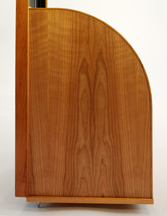
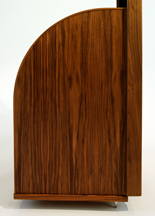
Shown on left is a Model 10 in Natural Cherry & on right is a Model 11 in Natural Walnut
Speakers and Electronics are manufactured in Conifer, Colorado.


